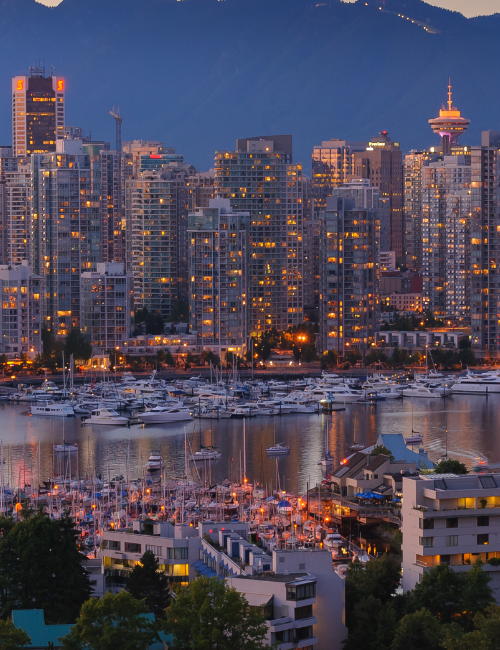
Cost of Living in Vancouver, WA
Thinking of moving to Vancouver, Washington? Well, you’re not alone! Vancouver has experienced a significant surge in new residents since 2021, driven by its robust economy, stunning scenery, and unparalleled location. It’s a fantastic place to live, offering something for everyone–especially nature lovers! In Vancouver, adventure is always within reach, whether you’re heading to the beach, exploring the mountains, or simply enjoying one of the city’s many parks and trails.
Despite being a neighbor to the significant city of Portland, Vancouver has managed to maintain its small-town charm and welcoming community vibe. Its prime location within the Portland metro area means you can enjoy easy access to both cities, allowing you to experience the best of both worlds: a fast-paced life in Portland and a quieter, more affordable lifestyle.
When it comes to the cost of living, Vancouver is often more budget-friendly than other cities on the West Coast. Residents benefit from a zero state income tax, lower utility costs, and a wide range of housing options. Although housing prices have risen in tandem with the city’s popularity, they remain lower than in Portland or Seattle, making Vancouver an attractive choice for families, remote workers, and retirees alike.
With its blend of urban convenience, natural beauty, and community feel, Vancouver, WA, truly offers the best of both worlds. Its excellent location, vibrant growth, and easy access to outdoor adventure make it the kind of place you’ll want to call home.
Breakdown Cost of Living in Vancouver, WA
Housing Costs

Finding a place to call home is the biggest challenge you’ll face when moving to Vancouver, Washington. For years, Vancouver has had a noticeable edge over its neighbor, Portland, in terms of housing. The city’s growing popularity, influx of new residents, and ongoing development have driven strong demand, with many homes receiving multiple offers, resulting in continually rising prices.
Comparison of Estimated Median Sale Prices (2025):
- Washington State: $658,700
- Vancouver, WA: $500,000
- Portland, OR: $520,000
- National Average: $466,000
As you can see, Vancouver remains one of the more affordable cities in Washington, particularly when compared to the state average or its nearby neighbor, Portland. While housing costs are higher than the national average, they still offer good value for those seeking proximity to the Portland metro area without the higher Oregon price tag.
Overall, you can expect to pay around $500,000 for a median-priced home in Vancouver. However, the city offers a wide range of housing options, from charming historic neighborhoods and downtown condos to new suburban developments on the city’s outskirts. Depending on the neighborhood, prices typically range from $400,000 to $600,000 on average.
Despite rising prices, Vancouver continues to attract new residents for its balance of affordability, livability, and location, making it one of the most desirable places to buy a home in the Pacific Northwest.
If you’re navigating the competitive Vancouver real estate market, our team is here to guide you every step of the way. Whether you’re buying, selling, or considering options with investor house buyers in Vancouver, we can help you make confident decisions in a fast-moving market. Contact us today to get expert support and personalized solutions tailored to your real estate needs.
Transportation
Vancouver, WA, is a car-centered city, and navigating without a vehicle can be challenging. Most residents rely on their cars for commuting, errands, and exploring the area, which can add up quickly with today’s high gas prices.
That said, C-Tran, the city’s public transportation system, offers bus services throughout Vancouver and express routes into downtown Portland. While it’s a convenient option for some commuters, route coverage is limited outside of central areas, and travel times can be less efficient compared to driving. Still, it’s worth considering, especially given Vancouver‘s increasing traffic congestion. The roughly 15-mile drive to Portland can take up to an hour or more during peak commute times, particularly across the I-5 bridge.
Average Transportation Costs (2025):
- Gas: Around $3.79 per gallon.
Tip: When driving to Portland, take advantage of Oregon’s generally lower gas prices, and you can often save a few cents per gallon by filling up across the river.
- C-Tran Monthly Pass: Approximately $100
For most people, driving remains the most practical means of transportation. However, with rising fuel costs and heavy traffic, living closer to work or near reliable public transit routes is becoming a top priority for many. And if you do find yourself stuck in traffic, the scenic views of the Columbia River and Mount Hood offer at least a small silver lining to your daily drive.
Utilities

One area where you can save in Vancouver, WA, is on utility costs, which tend to be lower than both the state and national averages. This includes all the essential services that come with homeownership, such as energy, water, internet, and phone services.
Average Monthly Utility Costs (2025)
- Energy (Electricity and Heating): Approximately $170 per month
- Water and Sewer: Approximately $90 per month
- Internet services: Approximately $190 per month
- Phone bills: Approximately $200 per month
Overall, Vancouver residents benefit from relatively affordable utilities compared to other parts of Washington and most of the West Coast. Of course, actual costs can vary depending on household size, home efficiency, and the chosen provider, but for most residents, utility expenses remain reasonable and manageable.
Food and Grocery
Food expenses are rising everywhere, and Vancouver, WA, is no exception. Grocery prices in the city average about 6% higher than the national average, which may not seem drastic but can add up over time.
For example, a dozen eggs in Vancouver costs around $4.87, compared to the national average of $4.14, roughly a dollar more. While these minor differences may not seem significant individually, they can add up quickly across your monthly grocery bill.
The good news is that Vancouver offers a variety of grocery options, ranging from large chains like Safeway, Fred Meyer, and WinCo Foods to farmers’ markets and local co-ops, where you can often find good deals and keep your food budget under control.
Healthcare

Healthcare costs in Vancouver, WA, are approximately 12% higher than the national average, which isn’t too surprising considering that Washington State, as a whole, tends to run roughly 10% above the national average. Residents should be prepared for slightly higher medical expenses compared to those in many other regions of the U.S.
Average Healthcare Costs (2025)
- Doctors Visit: Approximately $163
- Dentist Visit: Approximately $133
- Average health insurance premium: Approximately $543 per month
While healthcare is pricey, Vancouver offers access to several reputable healthcare providers and medical centers, ensuring residents have a range of options for both primary and specialized care.
Taxes
One of the most appealing aspects of living in Vancouver, WA, is that the state has no personal income tax, making it one of only nine states in the U.S. without this tax. This can help offset some of the higher costs of living compared to other states, making day-to-day expenses more manageable.
Although there are other taxes to consider:
- Income Tax: none
- Property Tax: Approximately 0.93% of the assessed home value
- Sales Tax: Approximately 8.7%
Tip: Shop in Portland for big purchases and take advantage of Oregon’s zero sales tax.
Property taxes in Washington are generally lower than the national average, which is another advantage for homeowners in Vancouver.
On the other hand, sales taxes on goods are higher than in many areas, averaging around 8.7%. This includes the 6.5% Washington state sales tax and approximately 2.2% local tax. While this may increase the cost of retail purchases, many residents appreciate the trade-off of no income tax and the ability to save on other significant expenses.
Overview of the Cost of Living in Vancouver
Overall, the cost of living in Vancouver, WA, is slightly higher, at around 6%, compared to the national average. Still, it remains more affordable than many major West Coast cities, such as Portland and Seattle. Residents can enjoy a strong balance between big city amenities and a laid-back lifestyle, plus the added benefit of no state income tax in Washington.
While housing and healthcare tend to be on the higher side, many people find that savings on utilities and tax advantages help offset these expenses. The city’s diverse range of neighborhoods and growing job market make it appealing to professionals, families, and retirees alike.
Vancouver offers a range of steady employment opportunities across various sectors, including education, healthcare, technology, and manufacturing. Major employers in the area provide competitive wages and benefits, and cities near Portland further expand options for commuting professionals. Startups and small businesses are also thriving, allowing entrepreneurs and freelancers to establish themselves in a supportive environment.
Vancouver’s proximity to Portland, OR, also means residents can enjoy easy access to more restaurants and entertainment, as well as international travel via Portland International Airport, without having to pay Portland’s higher housing or state income taxes (unless, of course, you work there).
In Summary:
- Cost of living: 6% above the national average
- Housing: more affordable than Seattle and Portland
- Utilities: approximately 6% below the national average
- Transportation: car-dependent, but has C-Tran option
- Groceries are around 6% higher than the national average
- Healthcare: roughly 12% higher than the national average
- Taxes: Trade-off with no income tax but higher sales tax
Vancouver strikes a unique balance between affordability, convenience, and lifestyle, making it a strong contender for anyone looking to live on the West Coast without the extreme costs of larger cities.
A Day in Vancouver, WA
While it’s essential to ensure that living in Vancouver fits your budget, it’s equally vital that it suits your lifestyle. Vancouver, WA, is renowned for its stunning outdoor beauty, making it a haven for nature lovers and those seeking a quieter, more relaxed way of life.
The city boasts over 90 public parks to explore and enjoy throughout the year. One prominent park worth visiting is Esther Short Park, the oldest public square in the Pacific Northwest, where you can unwind under the trees, browse the weekend market, or enjoy a picnic in one of the designated areas.
Take a stroll along the Vancouver Waterfront, where you’ll find scenic walking trails, interesting art installations, and breathtaking views of the Columbia River. If you’re in the mood for something social, explore the city’s thriving brewery and winery scene, which offers numerous opportunities to sample local craft beers and wines in a friendly and affordable setting.
Of course, Vancouver weather can influence your plans, as the city experiences rainy weather for roughly half the year. However, the rainy season brings its own charm, and there are plenty of indoor activities to enjoy. Vancouver boasts a vibrant cultural scene, featuring local breweries, wineries, museums, and art galleries, providing residents with numerous opportunities to enjoy their free time indoors. You can also go window shopping at Vancouver Mall or take the family on a free tour of the Water Resources Education Center to learn about the importance of water in the region. And when summer comes, you can enjoy perfectly sunny weather for more outdoor adventures.
Final Thoughts: Vancouver, Washington Cost of Living
Even with rising costs in housing, transportation, and everyday goods, Vancouver, WA, still maintains a competitive edge compared to other cities. With an overall cost of living roughly 22% lower than the state average and only 6% higher than the U.S average. Home prices remain more affordable than in many parts of Washington, and the absence of a state income tax makes it even more appealing. Combined with a good quality of life, Vancouver offers a great mix of modern conveniences and natural beauty.
The city’s slower-paced lifestyle is perfect for those who enjoy a relaxed, community-focused environment. Friendly neighbourhoods, strong schools, and community events make it a welcoming place for families, young professionals, and retirees alike. At the same time, its proximity to Portland provides opportunities for work, shopping, dining, and entertainment without feeling far from home.
Want To Sell Your Home And Move to Vancouver, WA?
We can help! I’m Isaac from Sell With Isaac, and we purchase property as-is. We specialize in helping homeowners sell their properties quickly and for cash. If you don’t have months to wait or thousands of dollars to spend on repairs, we’re here to make the process simple.
By selling to us, you can close in as little as 7 days, avoiding the hassle of repairs, house showings, drawn-out negotiations, and lengthy loan processing times. We buy houses for cash in Battle Ground, Vancouver, and other cities in Washington, making it easy for you to move on with your life.
See how we’ve helped other homeowners on our page. We guarantee a transparent and reliable sale, with an upfront all-cash offer. We can even send you a proposal today! Call us at (360) 207-4133 or complete the short form, and we’ll provide you with a fair and competitive cash offer for your home. No stress, no delays – just a fast and straightforward sale.
Helpful Vancouver Blog Articles
- Sell Your Vancouver, WA Home With Code Violations
- Tenant Damage To Property In Vancouver, WA
- Selling Your House As-Is In Vancouver, WA
- Selling Your Home In Forbearance In Vancouver, WA
- Free Things to Do in Vancouver, WA
- Fun Facts About Vancouver, WA
- Vancouver, WA Closing Costs Calculator
- Vancouver, WA Capital Gains Tax Calculator
- Vancouver, WA Cost of Living
- Best Things to Do in Vancouver, WA With Kids
- Should I Replace My Roof Before I Sell My House in Vancouver, WA?
- Do All Heirs Have to Agree to Sell Property in Vancouver, WA?

